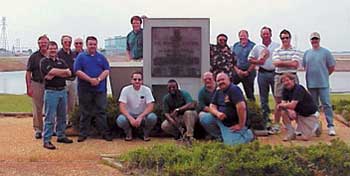
 Some members of the Local 772 Volunteer Organizing Committee are pictured outside the newly organized V.C. Summer nuclear station, in South Carolina, with Local 772 Business Manager Scott Fulmer (standing, third from right), Tenth District International Representative S. Eugene Gene Ruff (third from left) and International Organizer Lindsay Nelson (fourth from left). IBEW members have the required skills to operate, maintain and construct nuclear power plants within stringent regulatory requirements. Rigorous training is ongoing for all classifications of IBEW workers at nuclear generating plants. Forty IBEW local unions represent members employed at nuclear power generating plants in the United States and Canada. Some IBEW members are nuclear plant operators, mechanics, maintenance personnel, electricians, instrumentation and control technicians, as well as radiation control technicians, clerks and chemists. (See The Nuclear Industry: Many Uses With Impact on Daily Life, Parts I and II, November and December 1995). IBEW members also work in government-run laboratories that explore nuclear technologies, in manufacturing companies that provide machinery inside nuclear plants, and for construction contractors that build nuclear plants. The nuclear power industry is a highly organized sector. In addition to representing members in two-thirds of the operating nuclear plants in the United States and at Point LePreau station in New Brunswick, Canada, IBEW organizing efforts are ongoing. The IBEW has been very successful in organizing nuclear power plant schedulers and planners in recent years, said the IBEWs Paul. The schedulers/planners meet regularly to plan for and schedule all maintenance activities at a time that will cause minimal disruption of plant operations. The planners are experienced craft workers who have worked as plant operators, mechanics, electricians, etc.so they are very knowledgeable about all the integrated functions of a nuclear plant, said Paul. The duration of shutdowns has decreased significantly in the last 10 to 15 years. Shutdowns used to take six to eight weeks, whereas they now take three to four weeks, a huge improvement. Other recent IBEW organizing successes include representation election victories at the V.C. Summer nuclear station in South Carolina, and at the Donald C. Cook nuclear plant in Michigan. Donald
C. Cook In 1999, IBEW Local 1392, Fort Wayne, Indiana, organized the Maintenance Unit at the D.C. Cook nuclear plant located near St. Joseph, Michigan. The D.C. Cook plant had operated nonunion from the time it was built about 30 years ago, said Sixth District International Representative Alan P. Goddard, who previously served as business manager of Local 1392. We had three campaigns there in the past. The Maintenance Unit had about 70 people when it was first organized, said Goddard. Since that time, the employer has doubled the size of the IBEW-represented Maintenance Unit and gotten rid of contract employees. The local union currently is conducting organizing campaigns among the other employees at the plant, said Local 1392 Business Manager David L. Schimmel. V.C. Summer Nuclear Power Plant: In South Carolina, IBEW Local 772, Columbia, scored a major organizing victory at V.C. Summer nuclear power plant earlier this year. This was the first-ever campaign at V.C. Summer. Local 772 represents South Carolina Electric & Gas employees. The V. C. Summer station is the first nuclear plant to be organized in the Carolinas, said Tenth District International Representative James T. Springfield. Most of the unorganized U.S. plants are in the Carolinas. There are six other nuclear power plants in North and South Carolina, and ongoing organizing efforts are underway at several locations where employees have expressed an interest in union membership, Springfield said. Approximately 315 members are in the bargaining unit at V.C. Summer, which was organized from the ground up. The unit includes all full-time and regular part-time operations and maintenance employees. The new IBEW members work as reactor operators, planning specialists, chemistry specialists, quality control inspectors, clerical personnel, and electrical, mechanical and I&C maintenance personnel, and other classifications.
|
Part 1 - New Look at Nuclear Power: One Key Part of the Energy Mix Part 2 - Report of the National Energy Policy Development Group Part 3 - Achievements Worth Noting: Strong Safety Record and Efficiency Gains Part 5 - Growing Public Support For Nuclear Power Part 6 - Yucca Mountain and the Waste Disposal Dilemma Part 7 - Streamlined Designs Promise Lower Cost, Improved Safety For Reactors |